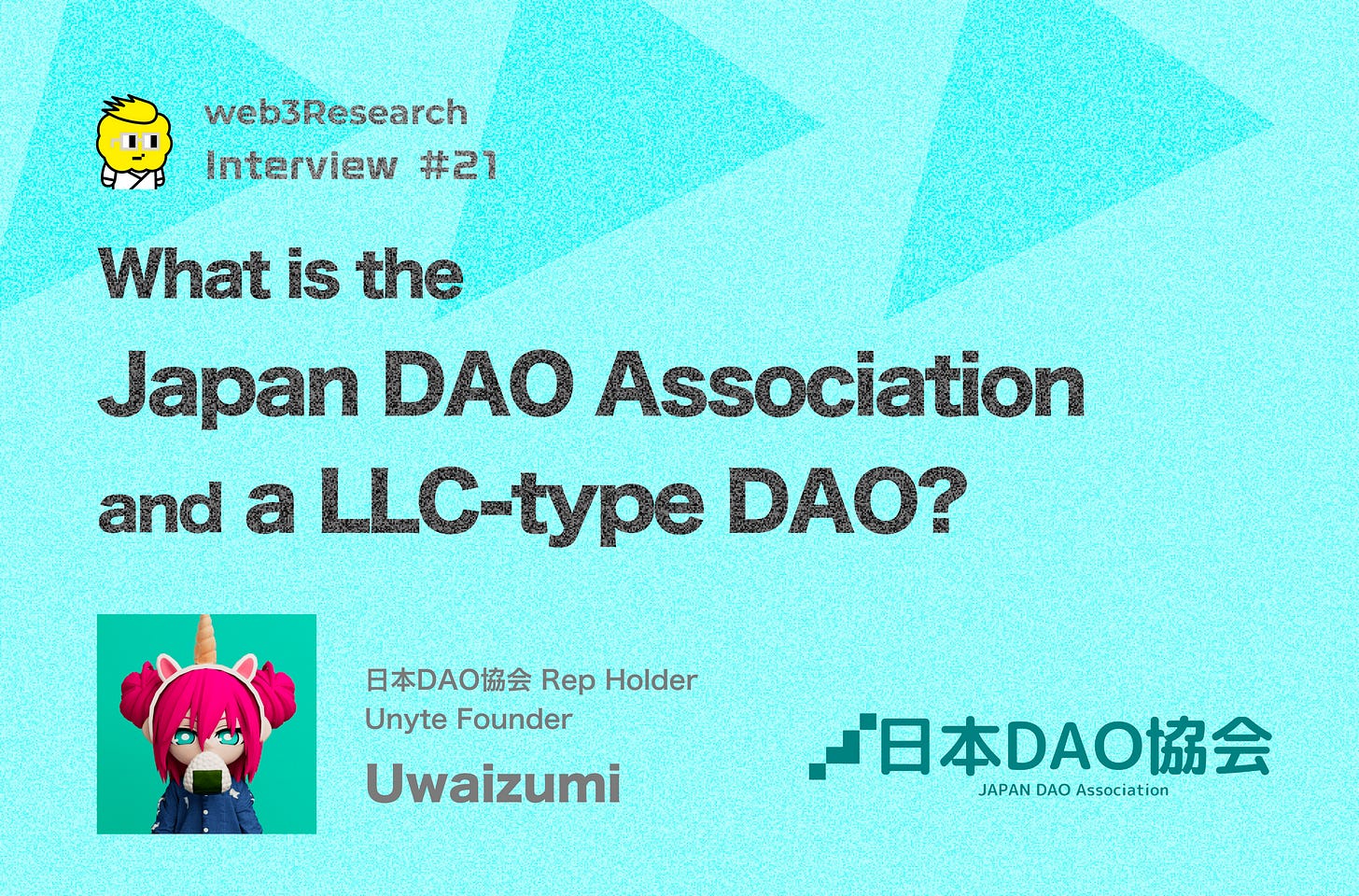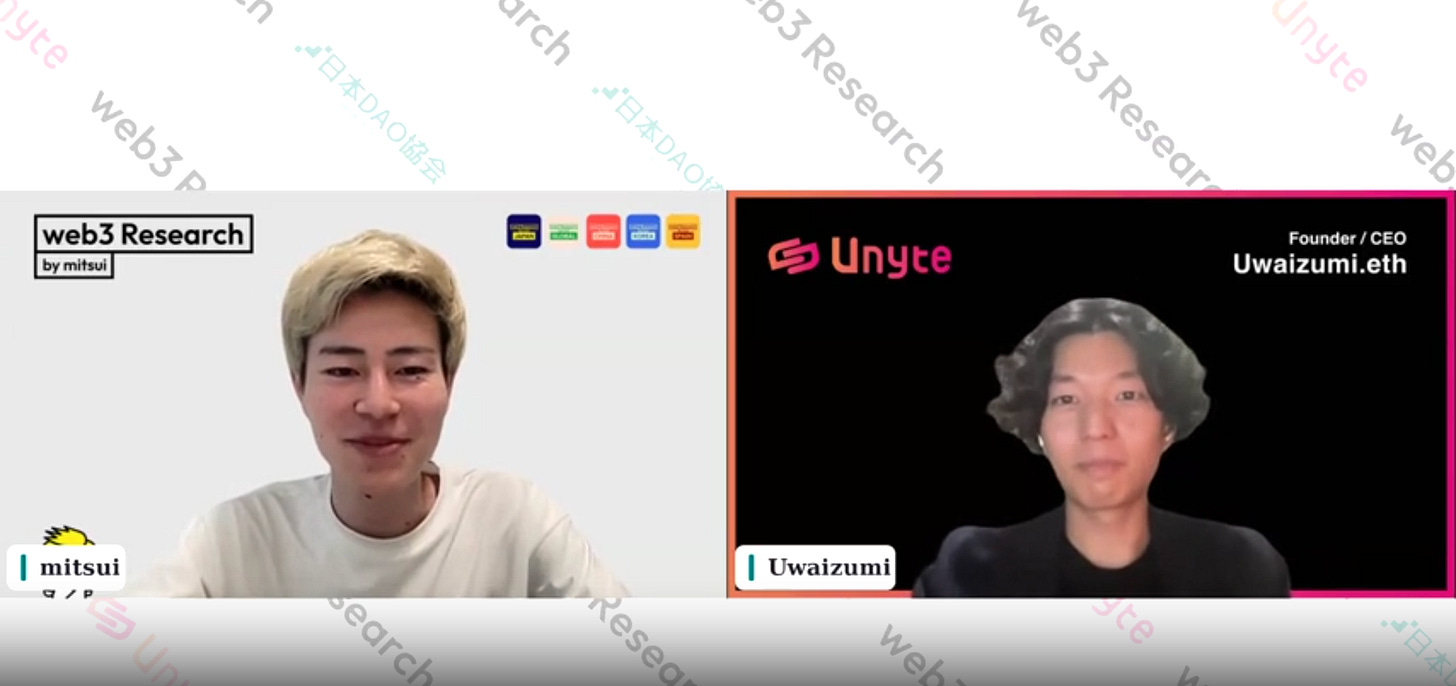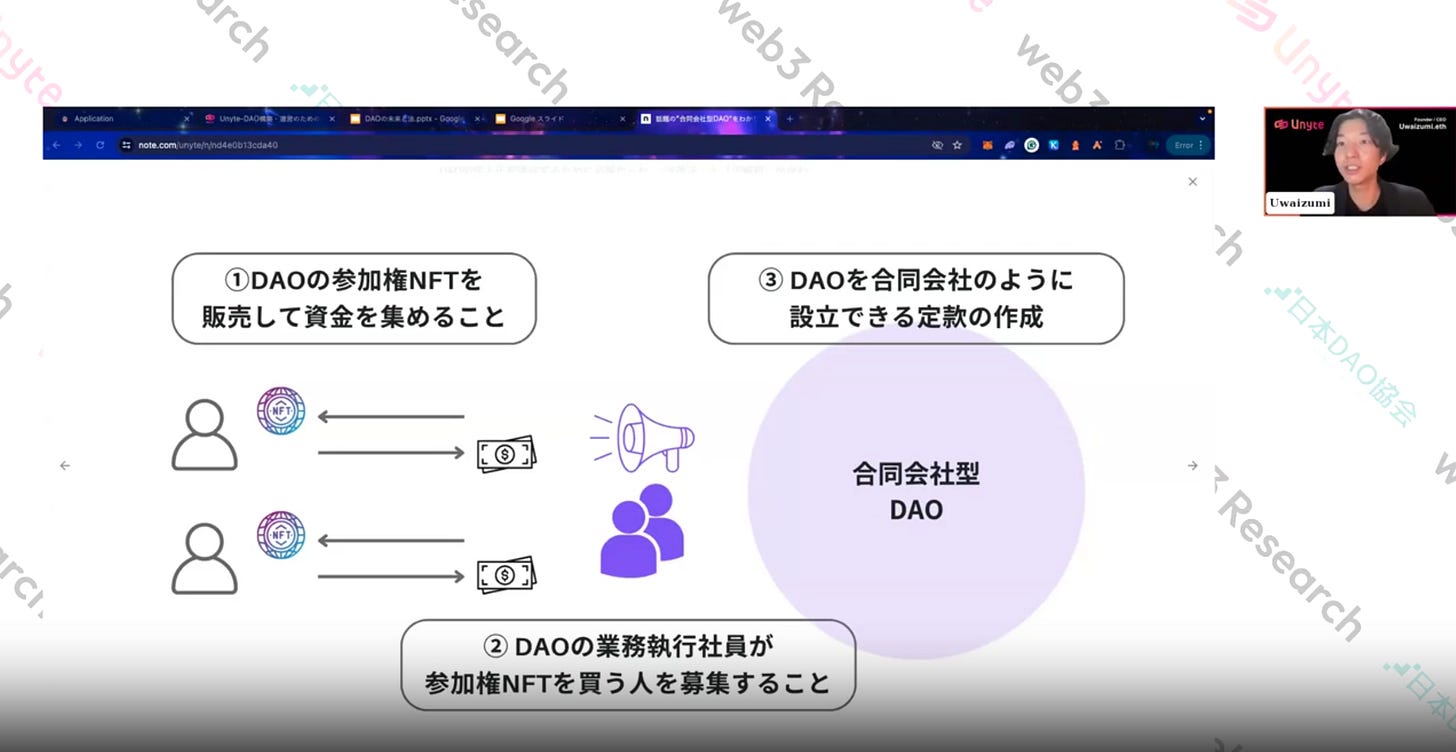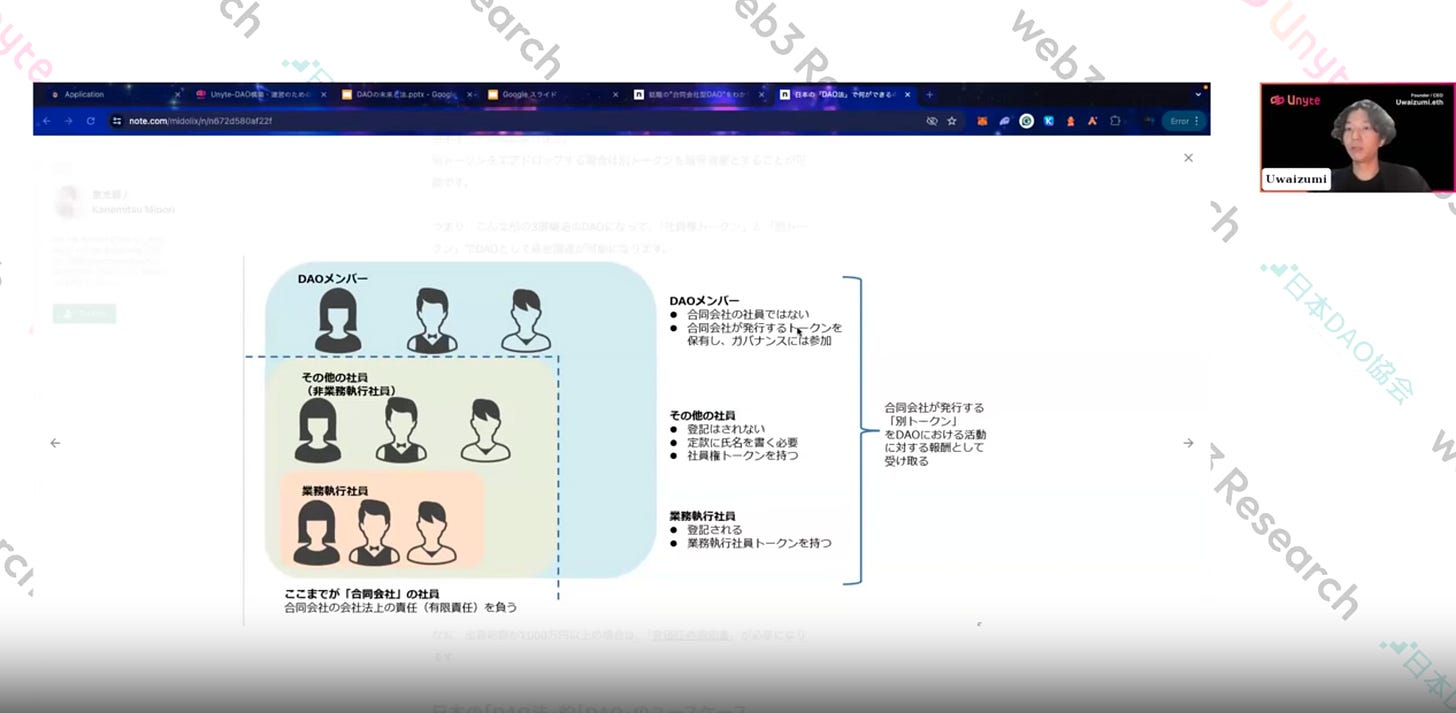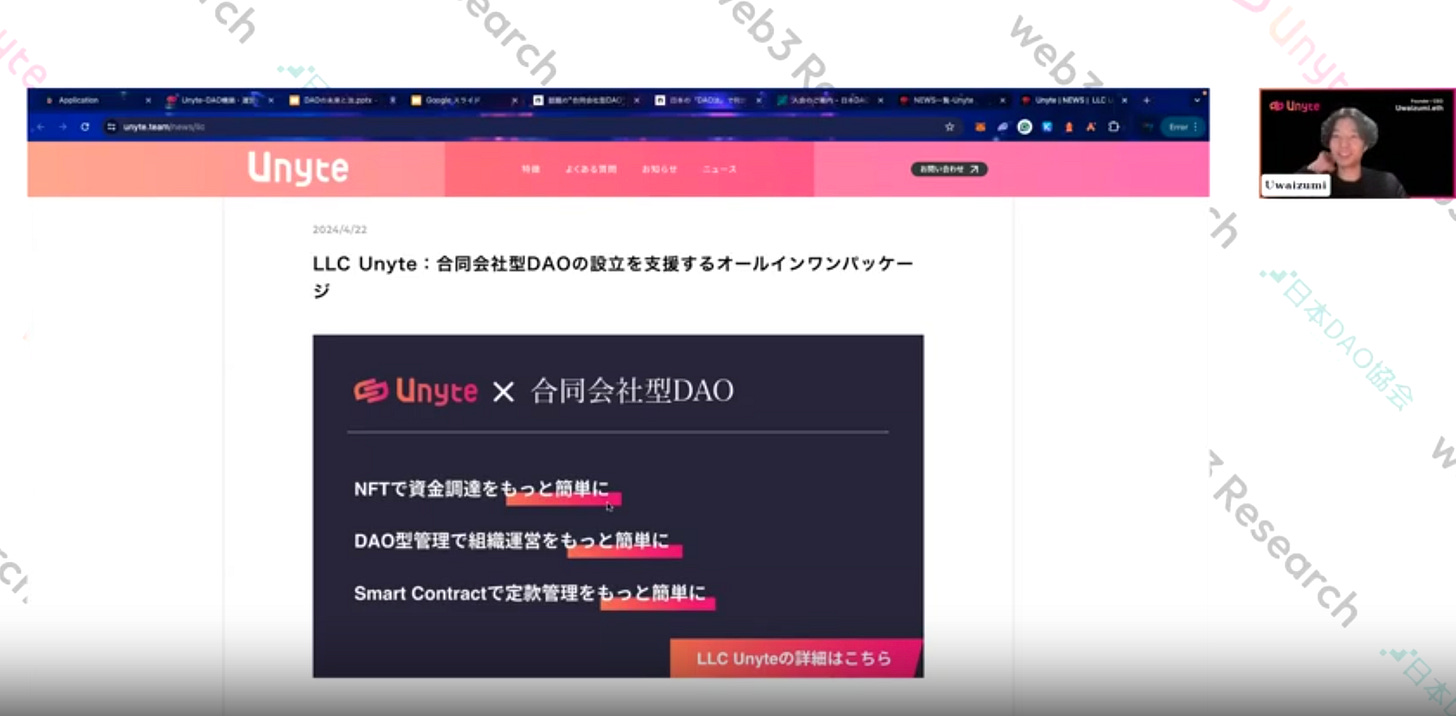What is the Japan DAO Association and a LLC-type DAO? / guest @0xUYZ
What is the recently announced and much talked about "Japan DAO Association" and what is a Japanese-style "limited liability company-type DAO"?
Good morning.
This is mitsui from web3researcher.
Today's interview is with Uwaizumi, a Unyte Founder and Rep Holder of the newly established Japan DAO Association, about the "Japan DAO Association" and the Japanese-style "limited liability company-type DAO.
-First of all, please introduce yourself.
My name is Uwaizumi, and I am currently serving as a member of the DAO Association's Rep Holder Steering Committee.
I'm a kind of geek who is all about DAOs, as I run a tool for people setting up DAOs called Unyte, which recently supports limited liability company-type DAOs. I look forward to working with you today.
-How did you get hooked on -web3 and can you tell us about your career to date?
My earliest encounter with DAO was when I was a college student, so I learned about it during the IC bubble, in 2018, through my college research.
I was in the economics department at the time, and the seminar activity was a seminar where we studied quite a bit about new things. I had the opportunity to study machine learning and blockchain. At first, I was just aware that there was an amazing database, lol.
I didn't get that deep into it for a while from there, but shortly after I entered the workforce in 2021, NFT was very popular again, and I began to study it more deeply.
I became very involved in the process. I was also involved in various DAO activities at the time, but I got the impression that there was no infrastructure to create an infrastructure for DAOs, so we started by creating our own tools for DAOs and supporting existing DAOs.
-Please tell us about DAO associations and limited liability company-type DAOs.
Of course. I am also thinking that there are a lot of complicated parts, and I have been working on putting things together in-house to sort them out, so I will share some illustrations with you as I talk.
The first opportunity came from the LDP's web3 project team, whose recommendations led to the creation of DAOs with a legal personality.
At first, there were many DAOs in Japan and abroad, but they were seen as voluntary associations of volunteers rather than legally recognized organizations.
In a difficult way, it is called "association without rights" or "association without capacity." It is not a company, but an association where people get together to engage in some activity, and there are no specific rules.
On the other hand, there are many DAOs in Japan and around the world, and unless some kind of framework is set up, it is impossible to punish people for wrongdoing when handling money, for example.
Also, since we could not open bank accounts, etc., we did not have a wide range of activities, both good and bad, so it was decided that we should be incorporated as a DAO. We were in a position to make proposals, but the LDP members worked with us in various ways to create a framework, which we then proposed to them.
As a result, the DAO Law was promulgated, and on April 22, it became possible to create a DAO with a legal entity. This DAO with a legal entity is called a limited liability company-type DAO.
-Is the DAO Association positioned as an organization to broaden the scope of DAOs?
You are right. For example, when we wanted to start making rules for other DAOs, the LDP side raised the idea that we needed a group that could make ongoing legal proposals as an industry group, and this group became the recipient of that idea.
-I see. May I ask you more specifically what you have been able to do with a limited liability company-type DAO?
In a nutshell, these are the three.
One is that it is now possible to collect money by selling NFTs for DAO participation rights. The first is that it is now possible to sell NFTs for DAO participation rights, or the right to be an employee of a DAO.
The second restriction is related to the above, but it does not mean that anyone can sell DAO participation tickets to anyone, but there is a position called "DAO business executive employee," which is a difficult term to describe, but it is like the position of a high ranking person in a so-called company, Only these people are allowed to sell participation tickets NFT.
The third is that it is now possible to create this form as a limited liability company type. This amendment to the law is a kind of a mish-mash between a true native DAO and a limited liability company, and allows for DAO-like operations as part of a limited liability company.
Therefore, it is not that a so-called "perfect DAO" is suddenly possible, but the scope of the first amendment to the law is that the way a limited liability company operates can be done like a DAO.
-Can't the participation ticket NFT be FT?
There are many restrictions exactly, but basically NFT is the safest. if you do it with FT, some of the suspicious parts will come out.
-What is the difference between that and, for example, buying CryptoPunks and joining an exclusive community?
The same actions can be taken in the same way as before, such as buying participation tickets NFTs to participate in limited communities, or acquiring price gains through secondary distribution of participation tickets NFTs.
And apart from that, it's possible to receive a portion of the profits of a limited liability company as dividends. Essentially, a company is an organization for making profits, and there is already a mechanism for distributing them. This is called a dividend in both a stock company and a limited liability company, and it has always been possible to distribute a portion of the profits to the shareholders in a stock company or to the employees in a limited liability company.
This is exactly the same in a limited liability company-type DAO, where the holder of a participation ticket NFT in this DAO can receive a portion of the limited liability company's profits as dividends. On the other hand, the current law does not allow NFT holders to receive dividends that exceed the amount of their investment, i.e., the amount they paid when they bought their NFT.
For example, if you pay 100,000 yen to buy an NFT and become an employee, the dividend you get is limited to 100,000 yen. There are some restrictions like this, but one of the things that the DAO law allows us to do is to be able to receive a portion of the profits from our activities.
However, as mentioned earlier, there is no upper limit on dividends for those who are executive members, so we recognize the need to design this area well.
-What is an operating partner?
NFT holders are considered employees because they hold NFT participation tickets, and executive members are those who are responsible for the company, like shareholders or directors in a stock company. These people are treated differently from NFT holders. They are treated as representatives of the company and have their names and addresses on the company's registration.
However, as a representative of the company, the benefits you receive are greater, and you can receive dividends regardless of the amount of your investment.
-Can I also pay them as a regular salary other than -dividend?
You can do that just like a regular company. You can do it for the executive employees and for the employees of the NFT holder. In the end, it depends on the DAO, but you can have a DAO that only pays dividends, or you can have a DAO that pays salaries to employees based on their activities.
Outside of that one category, there is a category of token holders, so those people are treated a little differently than employees.
-Is this token holder referring to another token issued by DAO?
Yes, I will quoteMr. Kanemitsu of bitFlyer's classificationbecause it is very clear and I will explain it to you. These three categories exist, the outermost DAO members are the token holders I mentioned earlier, the employees are the participating ticket NFT holders, and the operating employees are those who take on the roles I mentioned earlier.
Token holders are those who have not invested but are participating; they are like those who participate in Discord but have not bought NFTs. These people are not legally employees, but you can give them tokens based on their activity. We call them reward tokens, but regardless of whether they are employees or not, we can give them tokens based on their activity and they can get some benefit from earning them.
-Can I issue as many employee ID cards NFT as I want?
According to FSA guidelines, if the number of securities is less than 1 million, it does not immediately fall under the category of securities, so basically, the idea is to keep the number of securities under 1 million to be safe. If it exceeds that number, it is treated as securities and requires a license, so basically, it is limited to 1 million pieces.
-Can people from overseas buy participation tickets NFT?
The answer is that the current law is strict. It is not stated that it is not allowed under Japanese law, but we recommend that it is better to keep it within Japan because some of the foreign laws may not allow those that receive dividends.
-But since it's anonymous, you honestly don't know who's buying, do you?
I don't know the conclusion. In case you are wondering, Japanese law requires us to list the names and addresses of our employees. However, by storing this information in a place where it cannot be viewed by the outside world, anonymity is ensured, so in theory, it remains unknown.
Therefore, I think it is necessary for DAO operators to check the box "not a resident of overseas" when asking people to purchase.
-Do you imagine that the executive members are replaced from time to time?
Although it is possible to replace a member, the name and address of the executive members are listed in the articles of incorporation, so registration is required if you want to add or reduce a member.
So, it is possible to set a term of office or to set becoming an executive employee as a reward for reward tokens.
-A nasty question, but are the executive employees obligated to follow the results of the vote by issuing an employee ID card NFT?
This is a difficult one. To be honest, it is difficult for me to give accurate advice, but I believe that there should be a legal obligation. The duty of due care is sometimes referred to as the duty of a good manager, and in general, the duty that exists when a person serves as a director or executive officer of a company also exists for an executive employee.
-Could something like a dismissal happen?
It can happen enough.
Each company must have its own set of rules, called Articles of Incorporation, that set forth the rules of the company, and these rules must be included in the Articles of Incorporation. For example, when appointing an executive director, a general meeting of the members is required, or the consent of 50% of the members is required, etc. These rules must be decided by each company.
-Can something like a deadlock occur due to people buying NFT but not participating in activities?
Yes, it can happen, depending on the setting.
So, basically, there should be a rule that important resolutions should be decided by resolution of the executive members. If the resolution is deadlocked, it will not work in many cases.
-I think it will be a DAO that doesn't work at all unless it is made in consultation with an expert,
Yes, we are making a lot of things in that area while asking our lawyers, and we also support them together.
On the other hand, we recognize that it is also the role of the association to absorb such issues, so we have created guidelines for the articles of incorporation.
-Is there any difference between this and the DAO method in other countries?
To be honest, it is difficult for us to say that there is a big difference between the two, since the DAO laws overseas are also ambiguous in some respects.
Overseas, the framework of legal entities is probably more famous for LLCs than for joint-stock companies and limited liability companies, but the legal entity is in line with the framework in Japan. In addition, I think that overseas DAO laws are positioned to recognize the framework of DAOs, but not the detailed positioning of dividends and the like. Therefore, I think that Japan is the fastest country in the world where a DAO can be operated by creating dividends, etc. in the form of a legal entity.
-I wonder if they can make them now?
Yes, you can create one. You can create a DAO corporation by drawing up articles of incorporation and taking them to the legal affairs bureau.
-Are there any specific use cases that you have already created or plan to establish in the future?
At the time of establishment, we envisioned a case in which we would jointly own the assets or work together on a project of some kind.
To be more specific, in the case of share houses, everyone contributes money to the share house, and the collected capital is used to buy or rent property and generate income. Various other legal entities, such as DAOs for research on generative AI, are beginning to emerge.
I think the word "clean" is the most apt description of what used to be a gray area, but is now easier to operate. Until now, it was not possible to open a corporate account, hold property, or make contracts, and in many cases, the operator had to make a contract with a corporation or other entity and rely on trust.
-What is your vision for the future?
We have been able to revise the law in this first round, but we do not believe it to be complete and would like to make recommendations for legal reform in an agile manner.
Specifically, our most recent ideas are "involving people from overseas" and "limiting dividends". We would like to come up with a proposal with a good idea of the restrictions in this area.
In addition, as an association, we also perform negative checks on DAO tools, etc., and certify them, so we would like to actively engage in activities to certify them as an industry to prevent fraud, etc. from occurring.
-If we want to voice our opinions, should we join Discord or something?
Yes, we are discussing this openly on Discord and opinions are always welcome. We would be happy to work with you to make policy recommendations.
https://discord.com/invite/fer5RGSqY8
-Thank you, I learned a lot. Do you have any final announcements?
Thank you very much.
At Unyte, which we operate, we would like to add more and more functions that are necessary for the establishment and operation of a limited liability company-type DAO.
One of the things we would like to do is to create a package that will allow us to launch a limited liability company-type DAO, and one of the packages is this one called "LLC Unyte". Please allow me to introduce it to you.
Specifically, the NFT sales I mentioned earlier and the writing of the employee list require quite complicated actions, so I have combined them into a single tool.
The first function is that we will support you by issuing new NFTs and setting up a website to sell NFTs. You don't need to own crypto assets or a wallet to participate in DAO as an employee.
You can also create Articles of Incorporation. The package is designed to allow users to input their addresses, and then we can manage the dispersed ownership and administration. Basically, the articles of incorporation need to be rewritten each time, but if you use our tool, we can rewrite them for you.
We will provide the necessary package for the establishment of a limited liability company-type DAO, including the above.
-Thank you so much.
Thank you very much. We are currently making and operating tools for DAOs after they are launched, but from now on we will be able to take care of the sales part, which is the first step in the process.
If you are interested, please send us a DM on X or send us an inquiry on our website, and we will respond with sincerity!
-Thank you very much for your time today! I learned a lot!
Yes, thank you very much!
"Official Link."
Disclaimer:I carefully examine and write the information that I research, but since it is personally operated and there are many parts with English sources, there may be some paraphrasing or incorrect information. Please understand. Also, there may be introductions of Dapps, NFTs, and tokens in the articles, but there is absolutely no solicitation purpose. Please purchase and use them at your own risk.
About us
A web3 newsletter delivered in five languages around the world. We deliver various articles about web3, including project explanations, news and trend analysis, and industry reports, every day. You can subscribe for $8 per month ($80 per year) and receive research articles that took 100 hours to complete every day.
Author
mitsui
A web3 researcher. Operating the newsletter "web3 Research" delivered in five languages around the world.
Contact
The author is a web3 researcher based in Japan. If you have a project that is interested in expanding to Japan, please contact the following:
Telegram:@mitsui0x
*Please note that this newsletter translates articles that are originally in Japanese. There may be translation mistakes such as mistranslations or paraphrasing, so please understand in advance.



